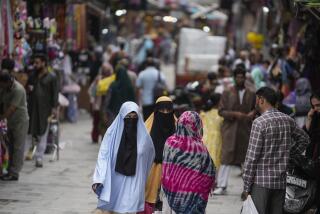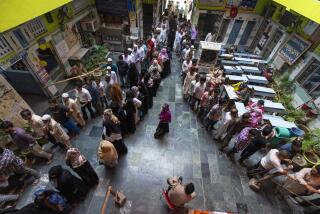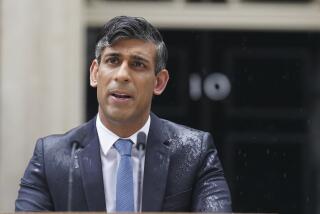India’s Leadership Plans to Seek Early Elections
NEW DELHI — Hoping to benefit from an economic boom and an improving image abroad, India’s ruling Bharatiya Janata Party decided Monday to seek early elections.
The BJP’s national executive ended a two-day meeting with a unanimous resolution calling for the move. Indian Prime Minister Atal Behari Vajpayee, 79, signaled that the voting could take place by April.
Vajpayee decided at the BJP meeting in the southern Indian city of Hyderabad that “if elections are held by April, then it will be good,” party spokesman Muktar Naqvi told reporters.
Vajpayee, whose five-year term ends in October, is expected to make a formal request to the country’s independent electoral commission, which would then set election dates.
Legislative elections are usually staggered over several weeks to accommodate the complex logistics of the world’s largest democracy.
The early elections would allow the BJP to capitalize on India’s booming economy, a thaw in relations with nuclear-armed rival Pakistan and an opposition that is in disarray after the BJP made strong gains in key state elections last year.
India’s economy grew at an 8.4% annualized rate in the last fiscal quarter, fueled by the services, farm and factory sectors. The economy is forecast to grow more than 7% in the fiscal year ending in March.
India’s stock markets are at new highs, and so are foreign exchange reserves, at more than $100 billion, and growing fatter by the week.
Last year, the BJP ousted the once-dominant Congress Party, India’s main national opposition group, from power in the states of Madhya Pradesh, Rajasthan and Chhattisgarh.
“I think the general feel-good factor, particularly on the economy, the unexpectedly positive showing in the assembly elections and the general disarray and demoralization in the principal opposition parties have encouraged the BJP to consolidate the advantage,” political analyst Ajai Sahni said.
Vajpayee is the frontrunner to become prime minister if the BJP-led coalition, called the National Democratic Alliance, returns to power, but that’s not guaranteed under the parliamentary system.
The prime minister is not directly elected, but chosen by a majority in Parliament, and India’s complex coalition politics can put seemingly unlikely candidates in the post.
“If Vajpayee is, under any circumstances, eliminated from the running, the strongest present candidate is certainly Deputy Prime Minister Lal Krishna Advani,” Sahni said.
But Advani, a hawkish Hindu nationalist kept in check by the more moderate Vajpayee, apparently faces strong opposition from various members of the ruling coalition, Sahni added.
“If the BJP is able to further consolidate its position in the elections, this may become irrelevant,” Sahni said. “If, however, that does not happen, and the NDA majorities remain tenuous and split, the circumstances under which the decision is to be taken will be decisive.
“Significant perceptions, for instance, of grave national security threats may give Advani some advantage. Other circumstances may throw up a ‘weak’ compromise candidate,” he said.
The Congress Party governed India for decades after independence from Britain in 1947. But its political fortunes have faltered under Italian-born Sonia Gandhi, the widow of assassinated former Prime Minister Rajiv Gandhi.
The party once produced leaders such as Mohandas K. Gandhi and Jawaharlal Nehru who could unite millions of disparate voters. But Sonia Gandhi now wages a constant war with her political rivals over the issue of her foreign roots.
The Congress Party “has no surviving cadre base, very few regional leaders of stature, and no coherent distinguishing ideological or policy platform,” Sahni said. “Its primary appeal is the so-called Nehru-Gandhi dynastic charisma. But, even in this regard, Sonia Gandhi is historically its weakest candidate, with the baggage of her foreign origin.
“Nevertheless, if the right balance can still be struck, there is the possibility of a fairly convincing campaign emerging,” Sahni said. “The party’s current leadership has yet to demonstrate the imagination and ability that is needed to arrive at such a balance.”
More to Read
Sign up for Essential California
The most important California stories and recommendations in your inbox every morning.
You may occasionally receive promotional content from the Los Angeles Times.










